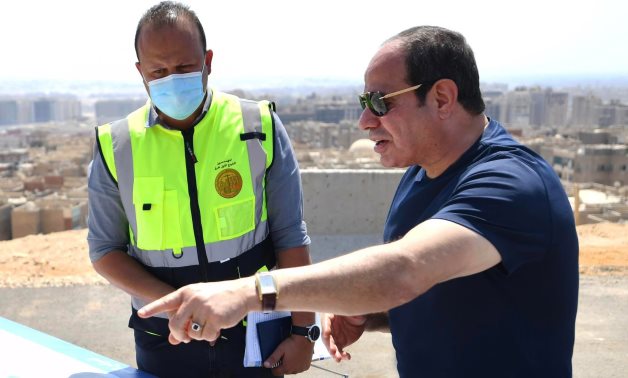
President Abdel Fattah El-Sisi inspected the construction work of a number of ongoing development projects of the roads and bridges infrastructure in Greater Cairo-press photo
CAIRO – 29 October 2024: A recent report by Business Africa highlights the top 10 African nations with the most improved infrastructure in 2023, featuring five Arab countries: Egypt, Morocco, Algeria, Tunisia, and Libya. According to the report, African governments, private sector investors, and international financial organizations are forging strategic partnerships to address the continent's infrastructure financing gap.
Egypt, in particular, has made substantial infrastructure investments through both government and private sector projects aimed at enhancing economic competitiveness, creating jobs, promoting inclusive entrepreneurship, and facilitating trade for resilient development. Egyptian government data indicate over 10 trillion EGP has been invested in infrastructure over the past decade, spanning projects in roads, ports, and railways.
With guidance from the Ministry of Planning and Economic Development, Egypt has widened private sector participation in infrastructure through successful public-private partnership (PPP) models, bolstered by national policies that actively encourage private investments. This approach has allowed Egypt to realize notable advancements in infrastructure and economic potential.
The Business Africa report also lists Mauritius, Seychelles, Kenya, Botswana, and South Africa as top improvers in African infrastructure. The African Development Bank reports that Africa requires an annual investment of $130 to $170 billion to meet infrastructure demands. Similarly, the World Bank estimates that Sub-Saharan Africa must invest approximately 7.1% of its GDP yearly to achieve Sustainable Development Goals (SDGs), although current investment levels hover around just 3.5% of GDP.
Despite these challenges, significant progress has been made in recent years, especially in energy, transportation, and technology sectors. This development is attributed to increased strategic alliances among African governments, private investors, and international organizations, all working to bridge Africa's infrastructure funding gap and foster sustainable growth across the continent.
Comments
Leave a Comment